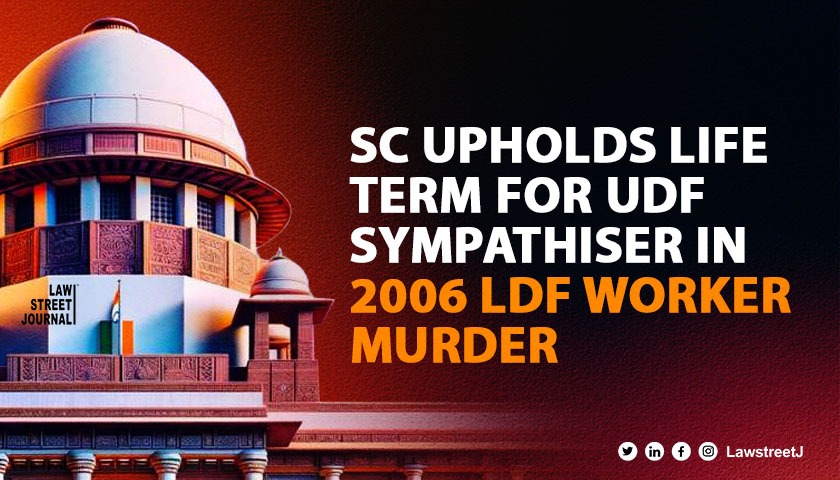NEW DELHI: The Supreme Court has upheld conviction and sentence of life term imposed on a UDF sympathiser for killing a rival LDF worker in 2006, saying offence like this leads to social unrest, weakening public confidence in rule of law.
The apex court rejected his plea for lack of intention and premeditation, and that the offence happened in private defense.
Supreme Court Rejects Plea of Private Defense, Confirms Life Sentence
A bench of Justices Vikram Nath and Prasanna B Varale said an intention to cause such injuries that are sufficient in the ordinary course of nature to result in death qualifies as murder. The court said even if ingredients other than intention to cause murder are proved, mere knowledge of the result of fatal actions is enough to ascribe culpability to the accused person.
The court dismissed an appeal filed by Kunhimuhammed alias Kunheethu, an IUML sympathiser in the case related to murder of Subrahmannian on April 11, 2006.
Political Rivalry Turns Deadly: Apex Court Denies Leniency in 2006 Murder Case
The incident was a fallout of workers of United Democratic Front (UDF) and Left Democratic Front (LDF) fighting against each other a day before in connection with the dispute regarding the drawing of their election symbol.
The deceased was attacked with tamarind stick but he snatched the stick and started beating the main accused, who in turn took out a knife and stabbed him on left side of chest, back of the head and the left shoulder, resulting into his death.
Deciding his appeal, the court said the offence occurred in a context of political rivalry, a factor that exacerbated its gravity.
Declining his plea for lesser sentence, the bench pointed out when the minimum sentence itself is life imprisonment, then grounds like parity, leniency, old age, health concerns, etc would not be of any aid to the accused while seeking reduction of sentence.
"Crimes rooted in such motives often have far-reaching consequences beyond the immediate loss of life, contributing to social unrest and weakening public confidence in the rule of law. The court must therefore ensure that its decisions reinforce the principle of accountability and deter the recurrence of such violent acts, particularly those that disrupt public order," the bench said.
After examining the facts of the matter, the bench found the appellant's plea for leniency on the grounds of spontaneity and lack of premeditation, private defense and old age as without merits.
The court upheld the Kerala High Court's September 18, 2018 judgment which dismissed his appeal against the trial court's judgment holding him guilty of offences under Sections 302, 324 and 326 of the IPC.
The appellant's counsel senior advocate Nikhil Goel claimed the incident arose out of a scuffle between two rival factions, during which the act of stabbing and killing the deceased was not premeditated but rather occurred spontaneously in the heat and spur of the moment. He claimed there was no deliberate intent to commit murder.
The bench, however, said the intent can be inferred from the circumstances surrounding the act, including the nature and location of the injuries inflicted, the weapon used, and the actions of the appellant during the incident.
"The injuries were concentrated on the vital parts of the deceased’s body, such as the chest and ribs, which house critical organs like the heart and lungs. The deliberate targeting of these areas indicates a clear intent to cause harm that could lead to death," the court said.
With the deliberate act, the bench said the appellant must have been aware of the likely fatal consequences of his actions.
The court said the decision to use a lethal weapon and the precise targeting of the victim’s vital organs are sufficient to establish the requisite intent for murder or at least knowledge of the possible consequences of one’s actions and to hold the appellant liable for death of the deceased as per clause 3 of Section 300, IPC.
Answering his plea for private defense, the bench said the number of injuries on the accused side by itself may not be sufficient to establish right of private defense as an overall view of the case has to be taken to check whether a case for private defence is made out from the evidence on record.
"The plea of exceeding the right of private defense under Exception 2 to Section 300, IPC, is not applicable to the appellant’s case," it said.
To his claim for applying parity with co-accused, the court noted the doctrine ensures fairness in sentencing when other accused persons are similarly situated and share the same level of culpability.
"However, parity is not an automatic entitlement; the role, intent, and actions of each accused must be individually assessed to determine their degree of involvement in the crime," the bench said.
The appellant also claimed he was 67 years of age and suffered from deterioration of health.
"While we empathise with the appellant’s personal circumstances, we find no compelling justification to interfere with the sentence imposed by the lower court," the bench said.
Once conviction under Section 302 of IPC is confirmed by all the courts, then the minimum sentence is imprisonment for life, as provided under the provision itself, the bench added.















